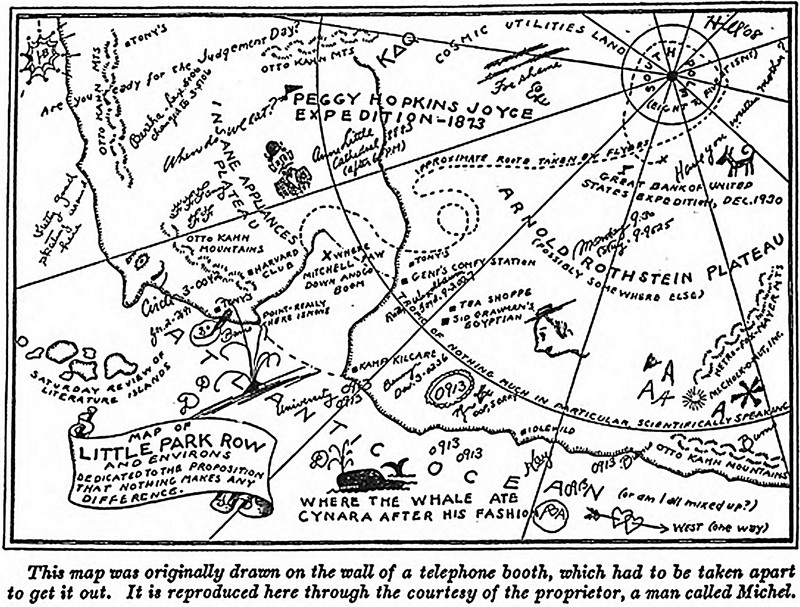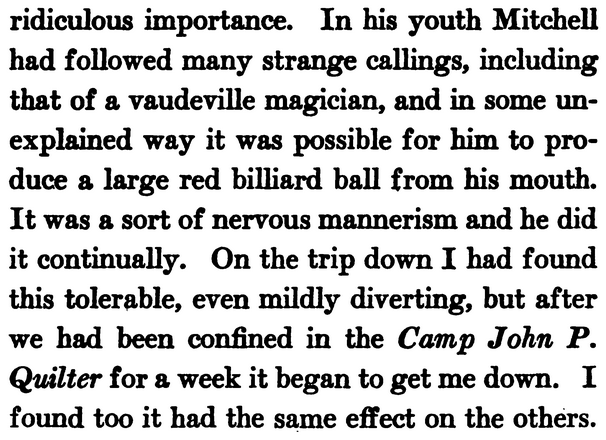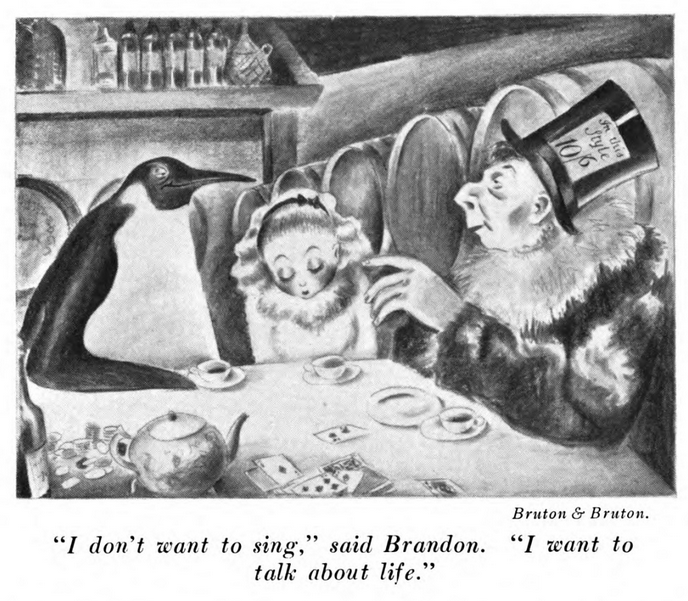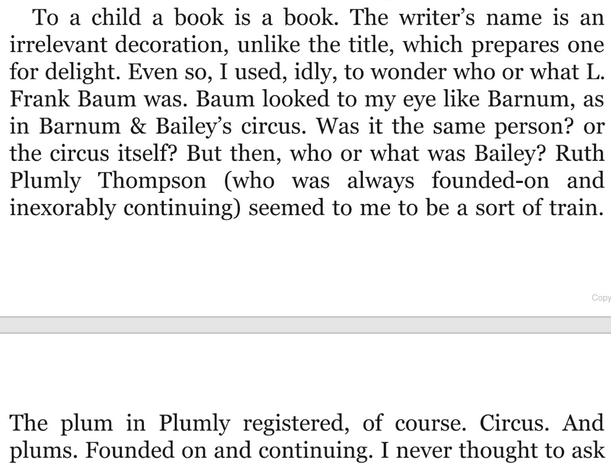
 |
|
|
 |
 |
 |
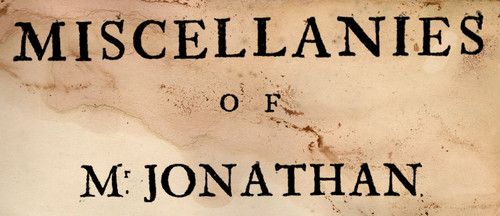
unearths some literary gems.
Some snippets from Dorothy Parker reviews:
***It has far more plot and a much more connected story than most musical comedies. In fact, it's chock full of connected story; you don't get away from it for a minute. Large segments of connected story are always lying around the stage, getting in the way of the chorus.***They use the word "scintillating" as frequently and as proudly as if they had just coined it.***I take issue (there is nothing better for that morning headache than taking a little issue).[Btw, this bit strikes me as very "Steve Allen" (though it predates his career).]***Slack or no slack, out come books, any kind of books, any kind at all. The publishers take no advantage of their blessed leisure. They go right on publishing, all out of control. It seems to be a compulsive activity, a species, I should suppose, of tic.***The book, which is going to be a movie, has the plot and characters of a book which is going to be a movie.***His lovely ladies step out of Edith Wharton, and his graceful gentlemen come from Henry James (whenever you say Edith Wharton, you have to say Henry James right after. If you don't, you'll have bad luck all day).***[this one's from a letter]Alan and I are working on a little opera which was originally named "Twenty-two Hours by Air," but it has been kicking around the studio for a long time, during which aerial transportation has made such progress that it is now called "Eleven Hours by Air." By the time we are done, the title is to be, I believe, "Stay Where You Are."***
|


 |
|
|
 |
 |
 |

unearths some literary gems.
From Bird Life at the Pole, by Wolcott Gibbs:
***
I entered the discoveries at appropriate intervals on a blank map of the polar region which had been donated to the expedition by the National Geographic Society.
[Resulting map attached, along with a screen-cap snippet and a "who needs context?" illustration.]
Gibbs_magicianGibbs_trio
|





 |
|
|
 |
 |
 |

unearths some literary gems.
From The American Claimant, by Mark Twain:
THE WEATHER IN THIS BOOK.
No weather will be found in this book. This is an attempt to pull a book through without weather. It being the first attempt of the kind in fictitious literature, it may prove a failure, but it seemed worth the while of some dare-devil person to try it, and the author was in just the mood.
Many a reader who wanted to read a tale through was not able to do it because of delays on account of the weather. Nothing breaks up an author’s progress like having to stop every few pages to fuss-up the weather. Thus it is plain that persistent intrusions of weather are bad for both reader and author.
Of course weather is necessary to a narrative of human experience. That is conceded. But it ought to be put where it will not be in the way; where it will not interrupt the flow of the narrative. And it ought to be the ablest weather that can be had, not ignorant, poor-quality, amateur weather. Weather is a literary specialty, and no untrained hand can turn out a good article of it. The present author can do only a few trifling ordinary kinds of weather, and he cannot do those very good. So it has seemed wisest to borrow such weather as is necessary for the book from qualified and recognized experts—giving credit, of course. This weather will be found over in the back part of the book, out of the way. See Appendix. The reader is requested to turn over and help himself from time to time as he goes along.
|

 |
|
|
 |
 |
 |

unearths some literary gems.
From "The She-Wolf," by Saki:
***Leonard returned to his home circle garrulous about his Russian strike experiences, but oppressively reticent about certain dark mysteries, which he alluded to under the resounding title of Siberian Magic. The reticence wore off in a week or two under the influence of an entire lack of general curiosity.***“I wish you would turn me into a wolf, Mr. Bilsiter,” said his hostess at luncheon the day after his arrival.“My dear Mary,” said Colonel Hampton, “I never knew you had a craving in that direction.”“A she-wolf, of course,” continued Mrs. Hampton; “it would be too confusing to change one’s sex as well as one’s species at a moment’s notice.”“I don’t think one should jest on these subjects,” said Leonard.“I’m not jesting, I’m quite serious, I assure you. Only don’t do it to-day; we have only eight available bridge players, and it would break up one of our tables. To-morrow we shall be a larger party. To-morrow night, after dinner—”***“If our hostess has really vanished out of human form,” said Mrs. Hoops, “none of the ladies of the party can very well remain. I absolutely decline to be chaperoned by a wolf!”“It’s a she-wolf,” said Clovis soothingly.The correct etiquette to be observed under the unusual circumstances received no further elucidation. The sudden entry of Mary Hampton deprived the discussion of its immediate interest.***
|



 |
|
|
 |
 |
 |

unearths some literary gems.
From Sights and Spectacles, by Mary McCarthy:
***Odets and Steinbeck[s’] . . . frequent ascents into “fine writing” are punctuated with pauses for applause that are nearly audible.***Mr. Maxwell Anderson, having already taken his title from Keats, presented one of his characters with the whole of Eliot’s Sweeney Among the Nightingales, which was recited twice and served once to bring down a curtain which might otherwise have stayed up forever.***Harvey, with its rabbit six feet tall, is the talk of the country, but this will not insure the next producer against the failure of a play about a short giraffe.***Though [the plays of George Kelly] are performed by actors, their complete cast of characters is not listed on the program, their real heroes being glasses of water, pocketbooks, telephones, and after-dinner coffee cups.***The Hamlet echo is part of the joke, like a Mona Lisa on a moustache.***[In Congreve], physical existence itself is the jest.***These plays are not contemptible . . . . But the heavy workmanship of these structures is out of all proportion to their function; it is as though one were to make an umbrella out of solid marble.***
|

 |
|
|
 |
 |
 |

unearths some literary gems.
From The Emerald City of Oz, by L. Frank Baum:
[In case Rigmarole Town is new to you, as it was to me (until Gore Vidal, of all people, pointed me to it).]"Is this Rigmarole Town?""Sir," replied the boy, "if you have traveled very much you will have noticed that every town differs from every other town in one way or another and so by observing the methods of the people and the way they live as well as the style of their dwelling places it ought not to be a difficult thing to make up your mind without the trouble of asking questions whether the town bears the appearance of the one you intended to visit or whether perhaps having taken a different road from the one you should have taken you have made an error in your way and arrived at some point where—""Land sakes!" cried Aunt Em, impatiently; "what's all this rigmarole about?""That's it!" said the Wizard, laughing merrily. "It's a rigmarole because the boy is a Rigmarole and we've come to Rigmarole Town.""Do they all talk like that?" asked Dorothy, wonderingly."He might have said 'yes' or 'no' and settled the question," observed Uncle Henry."Not here," said Omby Amby. "I don't believe the Rigmaroles know what 'yes' or 'no' means."While the boy had been talking several other people had approached the wagon and listened intently to his speech. Then they began talking to one another in long, deliberate speeches, where many words were used but little was said. But when the strangers criticised them so frankly one of the women, who had no one else to talk to, began an address to them, saying:"It is the easiest thing in the world for a person to say 'yes' or 'no' when a question that is asked for the purpose of gaining information or satisfying the curiosity of the one who has given expression to the inquiry has attracted the attention of an individual who may be competent either from personal experience or the experience of others to answer it with more or less correctness or at least an attempt to satisfy the desire for information on the part of the one who has made the inquiry by—"[...]"If those people wrote books," Omby Amby remarked with a smile, "it would take a whole library to say the cow jumped over the moon."
|



 |
|
|
 |
 |
 |

unearths some literary gems.
***
The ingenuities we practice in order to appear admirable to ourselves would suffice to invent the telephone twice over on a rainy summer morning.
[I didn't realize it would be just as challenging to invent the telephone a second time as the first time; and apparently on sunny days (or in wintertime), the telephone remains uninvented altogether. (:v>]
***
The icy injunction cut in [Yeats's tombstone]--Horseman, pass by!--does little to encourage lingering, especially on the part of a motorist.
***
In order to diminish his baby-look, Maloney eventually grew a small mustache. As it happened, this did not make him look less baby-faced; instead...it made him look like a baby with a mustache.
***
His words...rarely emerged with distinctness from his mustache, and some of us used to speak wistfully of the possibility of combing the words one by one from that obstruction and arranging them in a comprehensible form somewhere outside it.
[N.B. Different mustache (and mustache bearer) from above.]
***
[Those writers and artists who contribute to the New Yorker but rarely set foot in the offices] are strangers, who exist for us as benign ghosts, haunting us not by their presence, as proper ghosts would, but by their absence.
***
Truax is a man so exceedingly secretive that he would gladly make up a story in order not to be able to tell it to anyone.
***
His quickness at mental arithmetic had turned him, in his youth, into a sort of one-man parlor game.
***
[Koren has] a drooping, dark mustache that I fear must make heavy demands on his energy.
***
Facts also amused [Harold Ross]. They didn't need to be funny facts--just facts. A series of factual statements set down with complete gravity could make him laugh because they took him by surprise or amazed him in some inconsequential way.
***
[The Wonderful O] points a moral, or maybe even two morals (the second being that nobody can remember the first)....As a medium in the great séance of letters [Thurber] is incomparable; he has only to utter an incantatory moan, and words levitate, phrases rap out unexpected messages, and whole sentences turn into ectoplasm.
***
[Bonus: One Erskine Hewitt was "named after [a] tombstone," because, the story goes, his father was caught without a name ready at the christening[!], and his panicked eyes fell on a tombstone bearing the surname Erskine.]
|


 |
|
|
 |
 |
 |

unearths some literary gems.
Some snippets from Nicholson Baker essays:
[from La Mer]What he played didn’t sound like the sea to me, but that wasn’t surprising, because nothing sounds like the sea on the bassoon.[from"Why I Like the Telephone"--precursing a similar comparison in Rock My Socks Off]You dialed some short number...and, miraculously, your own phone...would ring--a result that seemed, in those years before the discovery of other solitary auto-dialed pleasures, exotic and shocking and worthwhile.[from "One Summer"]I was working on a story about a man who by chance runs into his brain on the street. His brain is wearing a jaunty hat and is in a hurry. It has some kind of a sales job....The story was never finished.[ditto]A photographer...called up my mother, because he had heard that she could make funny faces....The ad, announcing a higher interest rate on savings accounts, came out in the newspaper...I spent a good deal of time making funny faces in the mirror in case a photographer called me.[from "Inky Burden"]Pages [of books], for the most part, live out their long lives in the dark...until suddenly, like the lightbulb in the refrigerator that seems to be always on but almost never is, one of them is called upon to speak.
|


Page 24 of 64

> Older Entries...

Original Content Copyright © 2025 by Craig Conley. All rights reserved.
|




